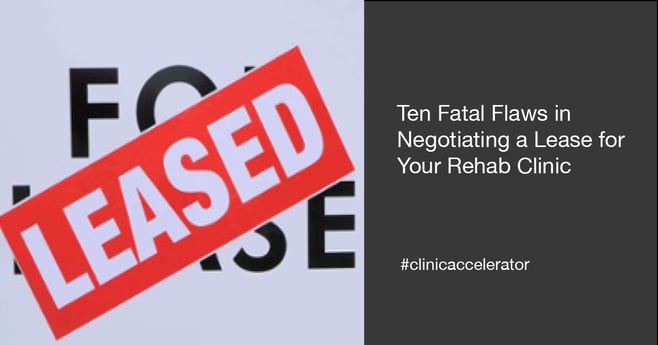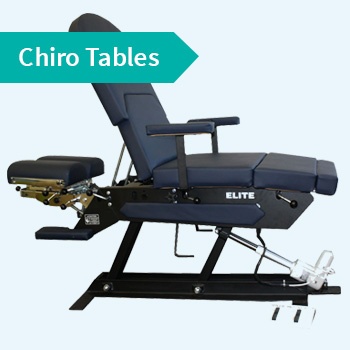You’ve found the perfect location for your new clinic or perhaps you're renewing an existing lease, now what?
It takes much more than doctor marketing, skilled therapists, and the latest equipment to run a successful clinic - location is everything.
While this is true, the lease terms, rental rate, and various other things (like parking) can all dictate much of your clinic’s success or failure as well.
Don't let the landlord bully you into signing your lease - especially before you've had time to thoroughly evaluate it and ask for what you want and need.
In this article we've got some top tips to help get you prepared for your upcoming lease agreement. Before you sign on the dotted line, here are ten fatal flaws to look out for when negotiating your lease.
#1 Don't rush
Take your time and do your homework.
Never accept the first offer the landlord gives you. If your lease is up for renewal, give yourself lots of time to negotiate.
Typically a lease negotiation takes between three to six months, and you should be countering the landlord's contract at least three times. Don't be afraid to negotiate. Keep in mind, the larger the space, the greater the bargaining power you have for negotiation. It's not easy for landlords to rent 2000 square feet or higher.
#2 Don't forget the "Option to Renew" clause
Always ask for an option to renew.
A renewal clause allows you to decide whether or not to extend your lease once the initial lease term expires. It is a challenge to predict what business and market conditions will look like five or ten years from now. So if you spend $100,000 renovating your clinic, and your lease term is five years, protect your investment by ensuring you have the option to renew the expired lease for another 5 years.
#3 Negotiate an extended fixturing period
If you are building your physiotherapy or chiropractic clinic from scratch, try to extend the fixturing period for as long as you can.
During this rent free period, you are allowed to occupy the premise to construct and install improvements and fixtures, or finish the interior. Ask for a four-month fixture period even if your contractors tell you that it will only take them two months to construct your clinic.
Expect delays during construction and delivery of rehab equipment. You don’t want to be paying rent while your clinic is still going through construction.
#4 Demand a tenant improvement allowanceDepending on the market, some landlords offer tenant improvement allowance to entice the tenant to lease the space. The tenant improvement allowance is a function of your lease terms and your lease rates.
Negotiate a favorable amount while still maintaining control of the improvement process. Aim to receive between $15 - $30 per square foot. For example, if your lease space is 2000 square feet, you can expect between $30,000 to $60,000 in tenant improvement allowance.
#5 Beware of the “Restore the Premises” clause
Always read the fine print.
You really want to be careful here and ensure that the "restore the premises" clause doesn’t exist in the contract.
Some landlords may require you to restore the leased space to its original condition when you terminate your contract. Never agree to this very expensive clause.
#6 Don't forget the "Exclusive Use" clause
Make sure to protect your business with an exclusive use clause.
This clause ensures no one else in the building is allowed to provide physiotherapy or chiropractic, orthotics, and massage therapy services. Granting an exclusive use clause will eliminate any competition within the same premise.
If the landlord owns two adjacent properties, request that the exclusive use clause be on both properties.
#7 Signage, Signage, Signage Both signage visibility and exposure are critical to your clinic - it's a
valuable part of your marketing.
Continuously look for exterior opportunities to place your signs, such as pylon signage at busy intersections, and backlit signs at the front entrance of your clinic. Signage must be clearly defined in your lease and define where you can place the signs and who is responsible for the costs.
Typically the costs are on you or shared between you and the landlord. Nevertheless, it doesn’t hurt to negotiate with the landlord to see if they are willing to cover a portion or all of the costs.
#8 Don't forget about the free parking
Who wants to pay for parking? No one - especially patients and your staff!
Patients will choose the competitor that offers free parking. Your staff will complain about it. And it's just going to be a huge downer for your clinic. It's absolutey essential to ensure that there is free parking for your patients and that there are no plans for paid parking to be implemented in future. Even go so far as to request a clause to prevent the landlord from charging your customer's parking fees in the future.
Another question to ask is, are there enough parking spots on the premise for all tenants and their clients? Request for designated employee stalls so that your staff has a reserved place to park.
If you are set on a location where there is no free parking offered, negotiate with the landlord for designated parking spots for patients, or at the every least, reduced rates for parking fees.
If all else fails, consider another location. If parking is really an issue, the reality is you will lose patients because of it.
#9 Beware of the "Demolition" clause
Verify that your lease does not have a demolition clause.
It is imperative to know that the landlord will not terminate your contract if they want to redevelop or demolish the building. The last thing you want to do is spend an extensive amount of money on renovating and building your clinic only to find out down the road that your landlord has sold the building to condo developers.
If there is a demolition clause, be cautious and determine what compensation you would receive should the landlord demolish or redevelop the building.
#10 Personal guarantees
If possible, never offer your personal guarantees on the lease.
Be wary because it is common for the landlord to want you to sign a personal guarantee. However, negotiate hard with the landlord and get them to accept the company guarantee.
Always protect your personal assets in the event that something does go wrong. If your landlord won't budge and is demanding a personal guarantee, request a time-limited guarantee. Ask your landlord to reduce the amount of time covered by the personal guarantee to one or two years as opposed to the entire term of the lease.
Other clauses you should also consider:
- Subleases & Assignments: Just in case things don’t work out, you need the ability to sublease the space so you find another tenant to rent your space. It may also be worth consdiering certain clauses for selling your clinic to other parties, you just never know what might happen down the line.
- Rent and Rent Increases: Try indexing your rent increases to an index like Consumer Price Index (CPI) so that you don’t get any big jumps. Also add the stipulation that if the index goes down, your rent does, too.
- Lawsuits: Check to ensure you are not responsible for any legal costs if the you and your landlord were to have a legal dispute in the future.
- Parking exclusion: Add a parking exclusion so if the landlord every turns that parking space into paid parking, you can get out of your lease
These are some of the most critical areas to consider when negotiating your lease. Always, always read and reread and make sure you understand everything that's included.
It never hurts to get someone else to read your lease contract, too. And, if in doubt, you can always consult a lawyer to help.









